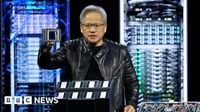Nvidia, the microchip manufacturing giant known for its pivotal role in the artificial intelligence (AI) boom, is set to face a staggering $5.5 billion hit due to new restrictions imposed by the U.S. government on chip exports to China. This development comes amid an escalating trade war between the two nations, which has seen both sides imposing steep tariffs on a variety of goods.
On April 15, 2025, Nvidia announced that the U.S. government informed them the previous week that their popular H20 AI chip would now require a license for export to China, including Hong Kong. This news sent Nvidia shares tumbling nearly 6% in after-hours trading, reflecting investor concerns over the potential impact of these regulations.
The U.S. government indicated that the license requirement is intended to mitigate the risk that these products could be utilized in or diverted to supercomputers in China. The indefinite nature of this requirement has raised alarms within the tech industry, as Nvidia's AI chips have been a focal point of U.S. export controls.
Founded in 1993, Nvidia initially gained recognition for producing graphics processing units (GPUs) primarily used in computer gaming. However, as the demand for AI technology surged, the company began integrating features into its chips that facilitate machine learning, positioning itself as a key player in the rapidly evolving tech landscape.
This recent setback is not the first for Nvidia. In January 2025, the company experienced a decline in its market value when reports surfaced that a rival Chinese AI application, DeepSeek, had been developed at a fraction of the cost compared to other chatbots, catching the U.S. off guard in terms of technological advancements.
Nvidia has stated that the anticipated $5.5 billion in charges will be related to inventory, purchase commitments, and reserves associated with the H20 products. The financial implications of these new export controls underscore the growing tensions in the tech sector, particularly as the U.S. seeks to maintain its competitive edge over China in AI technology.
As the trade war intensifies, the implications for Nvidia and other tech companies remain uncertain. Analysts are closely monitoring how these export restrictions will affect the broader market and the future of AI development in both countries. With the U.S. government tightening its grip on technology exports, the landscape for chip manufacturers like Nvidia is becoming increasingly complex.
The ongoing trade conflict has led to a flurry of tariffs and counter-tariffs, which have impacted various sectors beyond technology. As businesses navigate this changing environment, the stakes are high for companies that rely on international markets for growth.
In light of these developments, industry experts are questioning how long Nvidia can sustain its position as a leader in AI technology amid increasing regulatory pressures. The company's ability to adapt to these new realities will be crucial in determining its future success.
In conclusion, as Nvidia braces for the financial impact of these export restrictions, the ripple effects will likely extend beyond the company itself, influencing the entire tech industry and the ongoing dynamics of U.S.-China relations.


